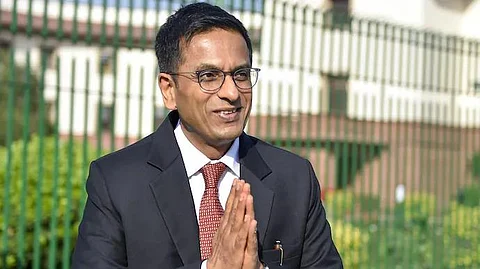

NEW DELHI: CJI DY Chandrachud after swearing in as the 50th CJI on November 9, 2022 had said that serving the ordinary citizens was his priority. While promising reforms in the registry and judicial process, he had said, “My work, not words, will speak.”
Justice, according to the CJI, has never been a sovereign function but an essential service provided to citizens, and the judicial reforms that have been introduced by him after taking charge speak volumes of his commitment to ensuring access to justice to common man in its truest sense.
To reach out to the citizens in the language that they follow and understand, the Supreme Court (SC) under CJI DY Chandrachud’s aegis had released on 74th Republic Day over 1,000 rulings translated in thirteen Indian languages ‑— Assamese, Garo, Hindi, Kannada, Khasi, Malayalam, Marathi, Nepali, Odia, Punjabi, Tamil, Telugu and Urdu. This was also introduced for Indianising the Indian judiciary.
To ensure transparency in the collegium’s decision for recommending names for judges, the collegium led by him, in a pathbreaking move, commenced uploading detailed resolutions on SCs website so that people are aware about who has been selected, why and the yearsticks that have been applied for such recommendation.
CJI DY Chandrachud had launched a ‘free text portal or search engine’ — eSCR (Supreme Court Reports) the official publication of SC as a tribute to the nation. It will cater to the needs of young lawyers who cannot afford taking private subscriptions of various portals providing database of rulings. While introducing the eSCR and making available more than 34,055 judgments published since 1950 onwards, It includes the facility of searching judgments based on various parameters such as phrase, words, all words, name of the Hon. Judge, Bench strength, volume, citation, date of decision, etc in eSCR.
By employing artificial intelligence (AI) and high-tech tools, CJI to make SC “court of record”, increase its accountability as a part of “judicial institution” and with an aim to help lawyers and students from law colleges also introduced live transcripts of constitution bench proceedings. CJIs commitment to accessibility and disability rights also resulted in him constituting “SC committee on accessibility” headed by Justice SR Bhat. The committee has been tasked with conducting accessibility audits of SC premises and its functioning, releasing questionnaires for persons with disabilities who visit SC, assess the nature and extent of the problems they face and prepare reports containing results.
With a view to point out discrimination against women in society, legal profession and language employed in the legal discourse, CJI had also unveiled the ongoing exercise of creating a legal glossary consisting list of words and terms that should be refrained by judges in their judgements and proceedings before the court.